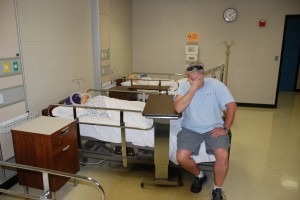No kidding. I had that excuse once and I think it was true because the kid's face looked like hamburger...I said no. I also don't excuse absences based on the flu or someone's desire to start Spring Break early. Less outrageous excuses: my aunt died, my grandparent died, I broke my shoulder snowboarding. I excuse those absences if they seem sincere. Last semester, one of my students' best friends was killed in a car accident in Wyoming. I not only excused the kid from class, we spent hours in my office over the next month talking the thing out.
I have a policy:
Regular attendance and active participation in class discussions are mandatory. You are permitted to miss two classes, excused or unexcused. For every absence beyond two (2), I will deduct 5 points (5%) from your semester grade. This includes absences excused by the University or your doctor.
Effectively, that means my students can have a week's worth of absences before it hurts their grade. I assume they will only miss class because they are ill or because something important came up. If they want to sleep in on a cold and rainy Tuesday morning when there's nothing due, though, that's their business. I assume these things won't happen often. Almost every job I ever had allowed me at least a week's vacation--they get one too.
And beyond the two I officially allow, let's be real, if the student has been engaged and keeping up with the work, and if they really ARE missing class for something important like a conference or a family emergency, why not cut them some slack? Unfortunately, it seems that tragedy and sudden intense illness most often strikes those who've already had attendance problems--specifically those who've already used up their week's worth of absences. Uncannily, it often strikes on or just before a day when major work was due to be handed in. For those folks, unless they can provide compelling evidence, the policy stands.
And in all cases where a student will miss a significant amount of class beyond the week allowed (say another week-and-a-half or more), I suggest they withdraw from the course and point out that their absences and missed work will make it impossible to pass. If my courses could be boiled down to readings from the book, what do you need me or the rest of the class for? This is what they call "teacher-centered" thinking...a form of thought-crime akin to "mechanic-centered" automotive repair and "carpenter-centered" house-framing and "doctor-centered" heart surgery.
My quaint policy's probably about to change. This week, one of the committees I sit on passed a policy change that would institute a University-wide attendance policy to forbid faculty from penalizing a student's grade for "excused" absences. Jail is not on the list, but "documented" illnesses, injuries, deaths in the family, sporting events, jury duty, etc., are. Not a word on what constitutes appropriate documentation. The new policy also requires alternative exams or assignments when such absences occur.
The vote was not unanimous and so this is my minority report.
I don't want to be unfair--the backers of the new policy are reacting to some ugly circumstances. In one case, a student's father died of cancer and a professor would not allow the student to make up an exam given on the day of the funeral! That's unconscionable. I think the Dean and the student's academic adviser had every right to hector the instructor for an explanation.
So the backers truly are reacting from the right place. But hard cases make for bad laws. As I see it, the issue in that case was a lack of compassion and clarity on the instructor's behalf that would have led them to consider an exception to a policy that is otherwise reasonable...and founded on experience. I'll grant that the policy will create some clarity, but it won't create a more compassionate professoriate. And that new clarity will make it easier for some students to abuse the system--after all, the policy diminishes the role of the instructor in negotiating what is and is not a legitimate absence. In fact, it creates a distinction between legitimate and illegitimate absences that implies that undocumented absences are bad--what if my best friend's father dies and I want to support him at the funeral? Emotionally, that may be just as powerful as the death of my own relative. What if I've got a bug and I'm too sick to get out of bed? Does that mean my illness was less legitimate than my roommate who saw a doctor for his sore throat? Under my policy, students have the power to decide what is a legitimate way to spend their two absences.
As for the committee, I won't rub my hands together and say I'm proud to work with these LOVELY people and then imply that they're idiots and charlatans. I'm not dismissive of their arguments, suspicious of their motives, or even unsympathetic to their reasoning. In fact, in their content-driven fields (rather than my skills-based field), a liberal attendance policy may even be appropriate. If the policy passes at the Faculty Meeting it will be because good people and worthy colleagues voted their conscience.
But this policy will hurt my students.
When I assign a final grade, I'm making a claim to the student, the university, and the world about how well the student met the objectives in my class. What if one of the course objectives is to enhance their collaborative skills or to develop workshopping skills? How do you assess students who aren't in class (or meeting with partners/groups) when those things are taking place? How do you recreate those experiences in makeup assignments? In writing classes, writing assignments are obviously the best way to assess student progress, but they're imperfect. Attendance alone is an even worse indicator...but taken together with coursework and reading quizzes and class participation, I'm confident that the grades I give are a fair representation of a student's accomplishment. If a student misses three weeks of my class, but has to be scored the same as another student who engaged daily in class, I'm no longer confident that my grade has as much meaning or integrity. In short, the student pays for the grade but they may not take away much else.



 They shot a few takes while I squatted near one of the light stands (everything has a name in this business--I know none of them). In one shot, Jenna's whisper was very clear to the whole room. She said, "This was so unexpected. Thank you." Then she stroked his hair.
They shot a few takes while I squatted near one of the light stands (everything has a name in this business--I know none of them). In one shot, Jenna's whisper was very clear to the whole room. She said, "This was so unexpected. Thank you." Then she stroked his hair.